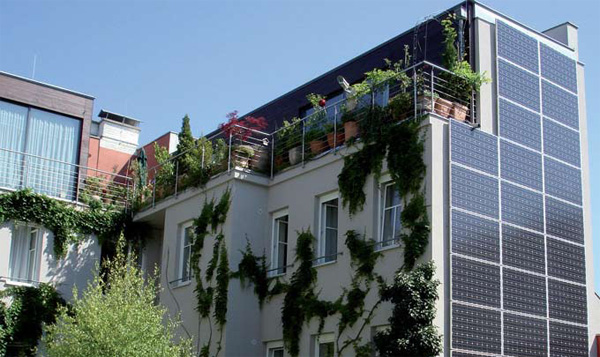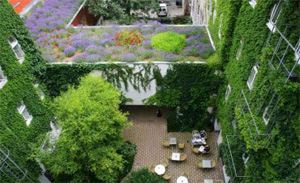The Boutiquehotel Stadhalle in Vienna claims to be the world’s first net zero energy city hotel making a case for sustainability in a highly consumerist and energy-centric sector.
By implementing new eco-friendly initiatives backed by systems from Siemens, Boutiquehotel Stadhalle in Vienna claims to be the world’s first net zero energy city hotel. It makes a case for sustainability in a highly consumerist and energy-centric sector.

INTRODUCTION
Hotels the world over are faced with a balancing act between their business goals, increasing expectations of a discerning clientele and changing environmental policies. Consequently, the timeframe of technology investments is often weighted against these criteria. Boutiquehotel Stadhalle in Vienna set itself the objective of achieving these goals. With its sustainability initiatives supported by technology from Siemens, it has now become the world’s first net zero energy city hotel. Its success story demonstrates the vital role sustainability plays in the hospitality sector and the importance given to the issue by cities themselves, as they compete to attract investors, corporate visitors and tourists.
THE BACKGROUND
Boutiquehotel Stadhalle in Vienna is a three-star (3 star+) eco hotel located in the 15th district of Vienna, between Westbahnhof and Stadthalle. It originally offered 42 rooms in a renovated period town house. An extension to the hotel with the construction of a new building saw the addition of a further 38 rooms in 2009.
CASE STUDY
 Ecology was already a prime focus of the hotel, before the extension work began. This was illustrated by a number of initiatives, including the use of rainwater from large cisterns located in the basement to tend the gardens and to flush the WCs and signage that generated its own electricity. But the focus of sustainability was heightened with the construction of the new building.
Ecology was already a prime focus of the hotel, before the extension work began. This was illustrated by a number of initiatives, including the use of rainwater from large cisterns located in the basement to tend the gardens and to flush the WCs and signage that generated its own electricity. But the focus of sustainability was heightened with the construction of the new building.
An important point to be noted here is that it is not a laboratory case study, but an ongoing initiative in the real world in real time, under natural conditions, with several variables coming into play at any given point of time.
Aim:
The aims of the green initiatives were two-fold:
Method employed – sustainable initiatives:
With the objective of the hotel ultimately being able to generate as much energy as it uses for its operation, it set about systematically implementing the necessary initiatives. To begin with, the use of renewable energy sources were deployed, which included solar thermal and photovoltaic panels and groundwater heat pumps.
Since heating and cooling are significant contributors to a hotel’s energy load, an in-house well was tapped to supply cooling energy and provide the heat pump system with groundwater. The power was set to be generated by 94 square metres of photovoltaic panels and 130 square metres of solar thermal panels. This is now used to heat the water for the hotel’s general areas and its 80 rooms, as well as pre-heating fresh air through a ventilation system which achieves over 90% heat recovery.
Central to the operation is a Desigo Building Automation System from Siemens, which offers intelligent energy management. Through integration of all the system components and processes,
Desigo ensures constant guest comfort and an efficient use of the hotel’s energy. It features programmable automation controllers along the needed workflow patterns, as well as flexible key performance indicators related to measurement and control technology that enable the monitoring and regulation of heating and ventilation based on actual demand or pre-defined schedules. The system also controls and monitors the concrete core activation, water heating, the solar panel system, buffer management and the geothermal heat pump. Desigo’s web-based operation enables energy data and reports to be accessed at all times, increasing energy monitoring capability, as well as consumption transparency and usage efficiency.
The hotel enjoys 83% annual occupancy rate. Recognising that the general public plays as important a role in sustainability as business organisations, the hotel has ushered in green-based guest engagement initiatives as a significant factor. Guests arriving by bicycle or by train receive 10% discount on the accommodation rate. Future plans also include the addition of two charging points to enable guests to plug in and recharge their electric cars at no cost – using energy generated by the hotel. Three proposed wind turbines are also awaiting planning permission.
CONCLUSION
With initial and ongoing sustainable initiatives, Boutiquehotel Stadthalle in Vienna has become the world’s first net zero energy city hotel.
Other positive outcomes:
For its environmental efforts, the Boutiquehotel Stadthalle was presented with the Environmental Award from the City of Vienna, which is part of Vienna’s EcoBusinessPlan. The Plan, launched in 1998 by the Vienna City Administration, Municipal Department for Environmental Protection, aims to help businesses generate ‘green and clean’ profits through ecological management practices that benefit both the environment and the enterprises. Amongst other goals, the EcoBusinessPlan aims to improve the competitive position of Viennese businesses through more efficient use of resources and to contribute to the sustainable development of the City of Vienna, thereby highlighting the emphasis put by cities worldwide on sustainability as an economic competitive advantage. The sustainability achieved by the hotel also demonstrates the relevant and indubitable fact that sustainable cities need sustainable hotels.
The Boutiquehotel Stadhalle was also the first in Vienna to receive the EU Ecolabel for tourism businesses who meet the strictest criteria by limiting their impact on the environment. Almost 20% of all EU Ecolabel licenses granted belong to the Tourist Accommodation Services category (one of 26 categories). This is a clear sign that recognition for environmental initiatives is increasingly becoming the key to generating sustainable business in the hospitality industry.
| What the key players say …Expressing his satisfaction about what the green partnership has achieved, Michael Hartmann, Senior Vice President, Head of Market Development Board Hospitality for Siemens, said: “Guest expectations are changing, and energy is supposed to represent the single fastest-growing operating cost in the hospitality industry. So, this is certainly one hotel that has recognised the opportunities to be more profitable in the long-run using energy efficient technology, while also, in parallel, meeting the needs of more environmentally sensitive customers without compromising on guest comfort.” With the demonstrable success of the initiatives, Michaela Reitterer, hotel’s Director and owner, who has turned the hotel into a model for sustainable tourism, is keen to keep up the ‘green’ momentum. |
Copyright © 2006-2025 - CPI Industry. All rights reserved.